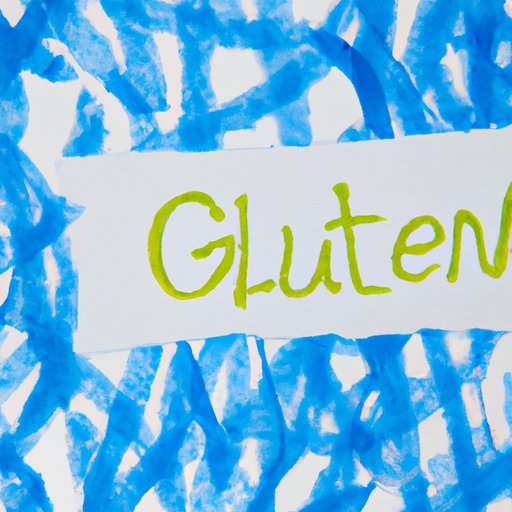
Introduction
Celiac disease is a chronic autoimmune disorder that affects the ability of the small intestine to absorb essential nutrients from foods containing gluten. Gluten is present in many common foods, such as bread, pasta, and baked goods. For those with celiac disease, eating these foods can cause a range of symptoms, from gastrointestinal distress to fatigue and anemia. If left untreated, celiac disease can lead to serious health complications. In this article, we will explore the symptoms, diagnosis, and management of celiac disease, as well as provide tips for a gluten-free lifestyle and managing mental health.
Overview of Celiac Disease Symptoms and Diagnosis
The symptoms of celiac disease can vary widely from person to person and may include gastrointestinal distress, fatigue, anemia, joint pain, migraines, and depression. These symptoms can be caused by other health conditions, making it difficult to diagnose celiac disease without proper testing. It is essential to seek medical attention if any of these symptoms persist.
The diagnosis process for celiac disease involves several steps, including blood tests, genetic testing, and an intestinal biopsy. Blood tests can detect the presence of antibodies in the blood that are produced in response to gluten. Genetic testing can determine if there are specific genes associated with celiac disease. Finally, an intestinal biopsy involves taking a small sample of tissue from the small intestine to examine for inflammation and damage that may be consistent with celiac disease.
Personal Account of Living with Celiac Disease
Living with celiac disease can be challenging, but with the right support and management, it is possible to thrive. For many individuals, the diagnosis comes as a relief after years of unexplained symptoms and struggles with health. Gluten-free living can be a significant adjustment, but with the proper resources and knowledge, it is possible to enjoy delicious and nutritious foods.
Challenges faced by those with celiac disease can include navigating social situations, dining out, and finding alternatives to favorite foods. However, there are many resources available, such as gluten-free menus at restaurants and online communities that can offer support and advice.
Celiac Disease vs. Gluten Sensitivity
While celiac disease and gluten sensitivity may share some similar symptoms, they are different conditions. Gluten sensitivity is not an autoimmune disorder like celiac disease, meaning that it does not cause damage to the small intestine’s lining. However, it can cause symptoms such as bloating, abdominal pain, and diarrhea. Unlike celiac disease, there is no definitive test for gluten sensitivity. It is diagnosed through a process of elimination after ruling out other causes of symptoms. Treatment for both celiac disease and gluten sensitivity is a gluten-free diet.
Gluten-Free Diet for Celiac Disease
A gluten-free diet is the only treatment for celiac disease, and it involves eliminating all sources of gluten from the diet. This includes grains such as wheat, barley, and rye, as well as many processed foods that contain gluten. Tips for grocery shopping, meal planning, and dining out can make adjusting to a gluten-free lifestyle more manageable.
Eating a well-balanced diet that is rich in nutrients is essential for individuals with celiac disease, as malabsorption of nutrients can lead to other health problems. Gluten-free grains and flours, such as rice, quinoa, and almond flour, can be used as substitutes for wheat flour in many recipes. It is also important to read labels carefully, as gluten can hide in many unexpected products, such as sauces, soups, and condiments.
Celiac Disease and Mental Health
Celiac disease can have an impact on mental health, and individuals with the condition may be at higher risk for developing mood disorders such as anxiety and depression. The stress of living with a chronic illness, as well as the social and emotional challenges of maintaining a gluten-free lifestyle, can also contribute to mental health problems.
It is essential to prioritize self-care and mental health alongside physical health in managing celiac disease. Strategies for managing both physical and mental health can include mindfulness practices, stress reduction techniques, and support from a mental health professional.
Celiac Disease in Children
Celiac disease can affect individuals of any age, including children. The symptoms of celiac disease in children can include diarrhea, vomiting, and failure to thrive. Diagnosis and treatment for children involve similar steps to those for adults, including blood tests, genetic testing, and an intestinal biopsy.
Navigating school and social situations can be challenging for children with celiac disease. However, there are many resources available to help parents and caregivers manage their child’s dietary needs. These can include gluten-free lunch options at school and support groups for families of children with celiac disease.
Conclusion
Celiac disease can be a challenging and life-changing diagnosis. However, with proper management and support, it is possible to live a happy and healthy life. If you suspect you may have celiac disease, it is essential to seek medical attention and get tested. A diagnosis can be life-changing, but it can also lead to a better understanding of your body and health needs. By following a gluten-free diet, prioritizing self-care, and seeking support when needed, those with celiac disease can thrive and live life to the fullest.




